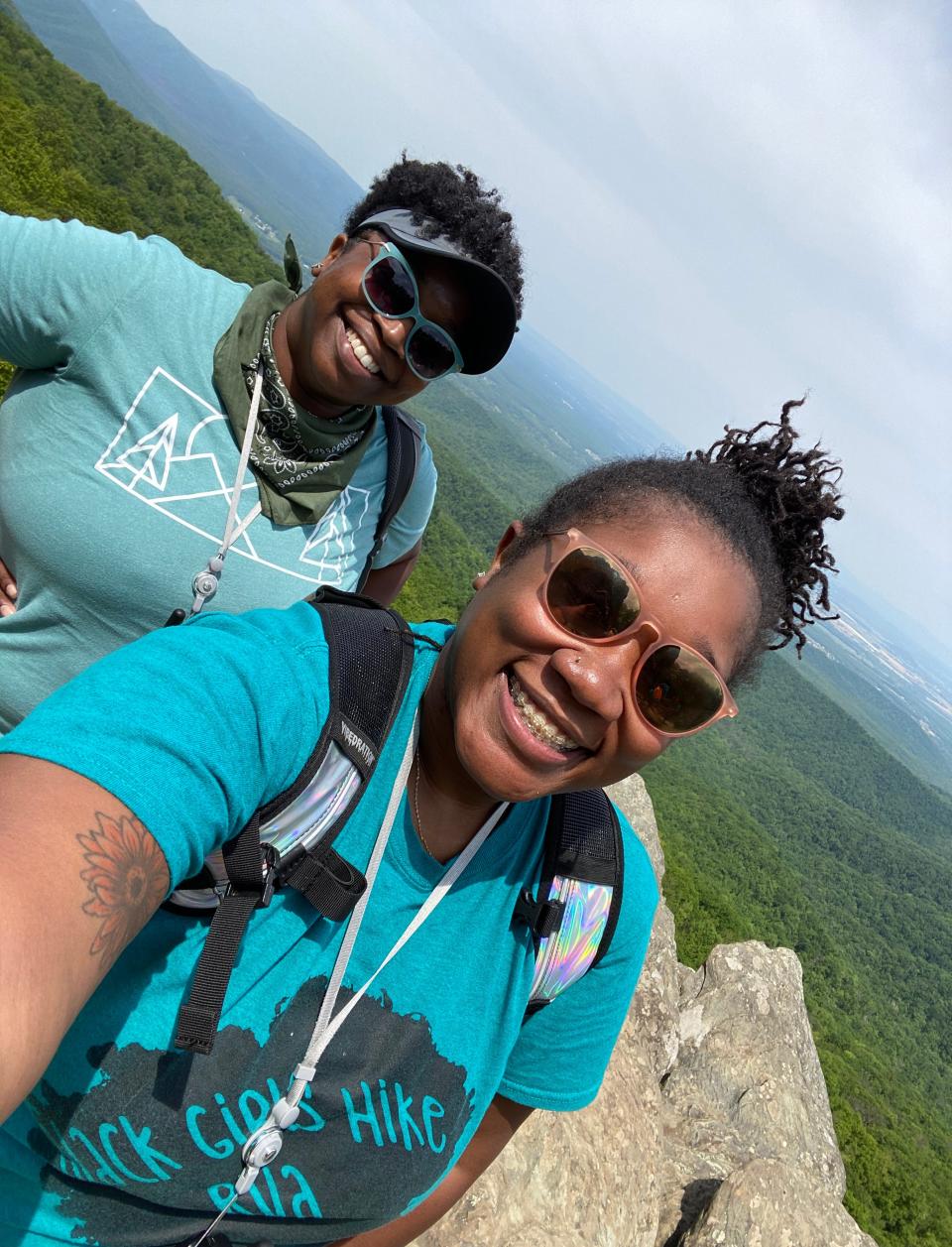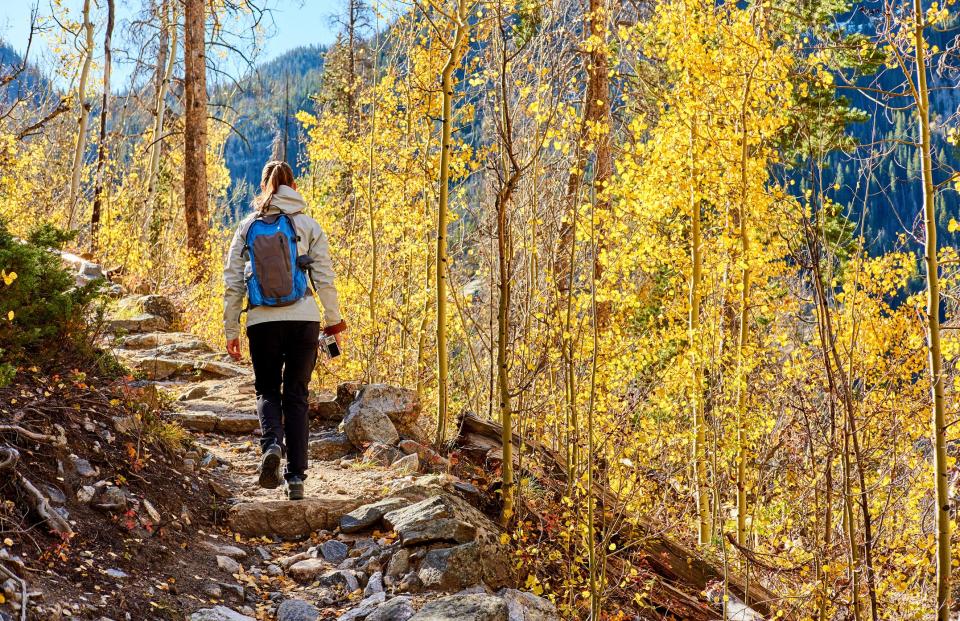Hiking hasn't always been accessible to all, but these groups are opening up the outdoors
Narshara Cade didn't go on her first hike until she was 31 years old.
"Of course, I asked, 'Do I need a hiking stick? What items do I need to be prepared?'" she said. "We couldn't even complete it that day. It was just so daunting."
Cade, who went on to co-found Black Girls Hike RVA, remembers how ill-prepared she was for the trail. She also remembers how few fellow hikers looked like her and her friends.
"There was one friend with us who was white, and at one point during our journey that day, someone asked if she was our tour guide or something because all of us were Black," Cade said. "So we just knew at that moment that Black people or people of color, in general, weren't really always seen in that space."
►'Not my fault there's not enough space': Plus-size travelers share struggles, show strength
►'The world is yours, too': What 'Real Queer America' author Samantha Allen wants LGBTQ travelers to know

According to a COVID-19-focused March report from the Outdoor Industry Association, more Americans have turned to the outdoors amid COVID-19 pandemic restrictions, "some for the first time and others for the first time in many years."
Hiking, in particular, saw a boost. RunRepeat and AllTrails, a hiking navigation app, published a study in August that found the number of hikes logged in 2020 was up 171.36% compared to 2019.
"With gyms closed early on in the pandemic, and social distancing in order around the globe, hiking saw bumps in the number of hikes, the number of users recording hikes, and hikes per user," RunRepeat said in a blog post.
As people from all walks of life headed outside, groups like Black Girls Hike RVA wanted wary newcomers to know the outdoors were meant for them, too.
Spending time outdoors can be difficult
"There's no right or wrong way to be outdoors," said Syren Nagakyrie, founder of Disabled Hikers, which aims to build community and justice for "disabled and other marginalized outdoors people."
There are however challenges for people with disabilities.
"A lot of trails, particularly when they're marked easy or even if they are listed as wheelchair accessible, they may not be," said Nagakyrie, who uses the pronouns they and them. "Perhaps they were originally designed to be accessible, but over time there's damage shifting things, like large cracks or places where roots have raised the surface."
Surface conditions can pose problems even without a wheelchair. How rocky, slick, or steep a trail is directly impacts its difficultly. Another important factor is how much effort is needed for various trails, particularly for people with invisible disabilities and limited energy, like Nagakyrie.
"I tend to move very slowly and awkwardly and have to stop and rest a lot," they said. "I will often encounter people who are just trying to rush me or push up behind me or try to push me out of the way."
Hiking was the second most popular activity in 2020 for Americans with 57.8 million participants through the year, according to Outdoor Industry Association's 2021 Outdoor Participation Trends Report.
Disabled Hikers, which was created by and for people with disabilities, provides the kinds of useful details needed to make hiking accessible.
"It's entirely possible to get out there and enjoy the outdoors," Nagakyrie said. "Just do whatever you need to do to be able to enjoy it."
Hiking is a healthy way to cope
Justin Yoder founded LGBT Outdoors in June 2019 "to connect the LGBTQ community to the outdoors and to each other."
"The Instagram grew so fast and had such a huge response that it soon led to a website and grew into a 501(c)(3) nonprofit," he said, noting much of the growth came during the pandemic, including new members who "never even thought about getting outdoors."
Yoder said even members who previously hiked once or twice a month began doing it weekly.
"A short hike can change your mental state, bring a sense of renewal and re-energize you," he said.
Kristen Valenti, a math teacher from Connecticut and longtime outdoors lover, felt those benefits as she found more opportunities to hike during the pandemic.
"It was also a healthy way of coping with all of the uncertainty," she said. Valenti has shared many of her experiences on Instagram and on her blog, through which she encourages readers to get outdoors and reap the benefits of hiking.
Cade wishes she had tried hiking sooner.
"The first time that I did finish (a trail), it was so emotional and breathtaking," she said. "And I just think about how my life would have been if I would have done something like this when I was like, I don't know, 12 or 15 instead of just going in at 31."
"It's just very eye-opening to the things that sometimes people of color don't have access to and they just miss out on," she added.
►'Can’t wait to get back out there': Asian American travelers won't let AAPI hate steal their joy
Everyone belongs outdoors
Cade's friend Nicole Boyd invited her on that very first hike. Unlike Cade, Boyd had grown up hiking, learning to love the outdoors early on.
"My dad was always outside," she said, fondly recalling running through city parks with him and hiking together on family trips.
She said he was the one who showed her and her brother that everyone belongs outdoors. "It doesn't matter what you look like, your ability, your anything. You deserve to be there."
Boyd and Cade are now sharing that message through Black Girls Hike RVA, which they co-founded in March 2020 and describe as a safe space and sisterhood for women of color outdoors.
"We know some people are coming to us with no experience, but we want everyone to feel welcome," Cade said.
She and Boyd note the outdoors have not always been welcoming.
"Historically, Black folks being outside, from take it back to slavery, all the way up to lynching, we just don't have a positive history," Boyd said. "We even have family members who, when we go out with a group of women, they're like, 'Be safe, be careful' because there are people that are in our lives that remember a time when it just wasn't a safe place for Black folks. I mean segregation in state parks didn't (end) until the ’50s and ’60s."
Black Girls RVA is based in Virginia, where segregation in public places was legal until 1964 when it was effectively ended by the federal Civil Rights Act.
Group members still occasionally get comments from strangers on their monthly hikes.
"Sometimes when we're out as a group, someone will say, 'Are you guys on a church trip? Are you guys on a field trip?' " Cade said, adding that she hasn't seen that happen "when there's a group of people of other races."
But that can't take away from the magic of being together outside.
"We've hiked with 18-year-olds all the way up to the oldest is probably 75, and it's incredible to hear those stories," Boyd said. "Talking to a 75-year-old Black woman about their experience in the woods and an 18-year-old hearing that story, you just can't create that kind of connection .... if you didn't have those women in that space."
Boyd and Cade, who are both eighth grade teachers, say they love learning from the women in their group and say it's an honor to share space with them.
►Come explore with us: Sign up for USA TODAY's Travel newsletter

Getting started
They and others suggest giving hiking a try.
"Maybe you don't even know the first thing about hiking or the outdoors. That is OK!" said Yoder of LGBT Outdoors. "We desire to help teach you and guide you along the way. And if we don't have an ambassador in your area yet, our main LGBT Outdoors Facebook group is a great resource to connect with others in your area ... It's easy to get started (hiking) with little to no cost and there are usually trails even near large cities."
Boyd suggested starting with a five- or 10-minute walk on a lunch break and building up from there.
"You don't have to go and climb Mount Everest," she said. "You can take baby steps. Just get out and try it."
Nagakyrie of Disabled Hikers encourages people to start close to home, perhaps at a city or state park.
"Those tend to be pretty well developed and have good accommodations and resources," they said. "Just start small and figure out what works for you."
Nagakyrie also suggested getting rid of preconceptions about hiking.
"There's this idea of the average hiker, your typical hiker ... But that's not realistic at all," they said. "Energy levels definitely vary a lot. And our needs can change from day to day. There's really no average hiker, no typical level of ability."
►Plan like a park ranger: Pro tips from experts who know national parks best
What are the safety rules for hiking?
There are some tips all hikers should consider.
Anna Marini, preventative search and rescue coordinator for Joshua Tree National Park, shared some key safety tips for hiking outdoors:
Bring a headlamp: "The biggest thing that we see probably across the park service really is people using their phones for a light, but that really drains your battery," Marini said. "Having an extra headlamp or something in your pack is super helpful."
Leave a note: In areas of spotty service, it can be hard to reach others. Marini said, "We get a lot of people calling and wondering where their family and friends are because they said they were supposed to be back at a certain time." Without cell service, hikers can't send updates when plans change or they need help. She recommends hikers leave a note on their cars or with a friend, including plans and backup plans.
Plan for longer than you think: "A lot of times people don't realize how long the hike is going to take them," Marini said, adding that every snack break or pause for picture taking adds up. She said it can be unexpectedly time-consuming and difficult to reach some of the vistas that look are so popular on social media.
Download or print a trail map before hiking: This will help hikers who may get lost in an area without cellphone service. Marini also recommends staying on trails.
There are plenty of resources for new hikers online, too. The American Hiking Society offers a slew of guides online including what to pack, how to plan and how to stay fit in the off-season, as well as helpful information on outdoor skills, safety and first aid, gear and trails.
In addition to the tips on its website, Disabled Hikers is also working on a guidebook, publishing next year.

This article originally appeared on USA TODAY: Hiking became popular amid COVID, but it hasn't always been accessible

 Yahoo Movies
Yahoo Movies 
